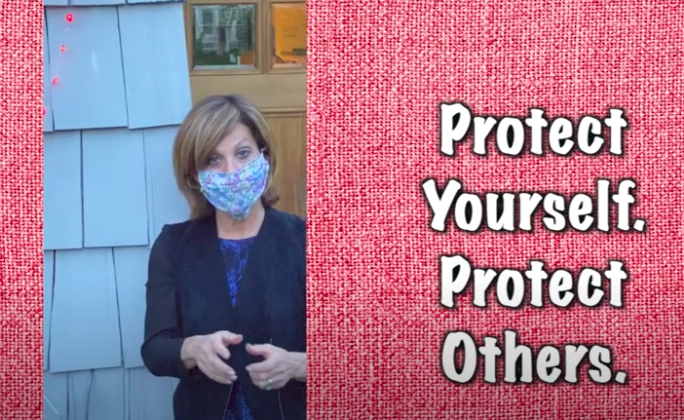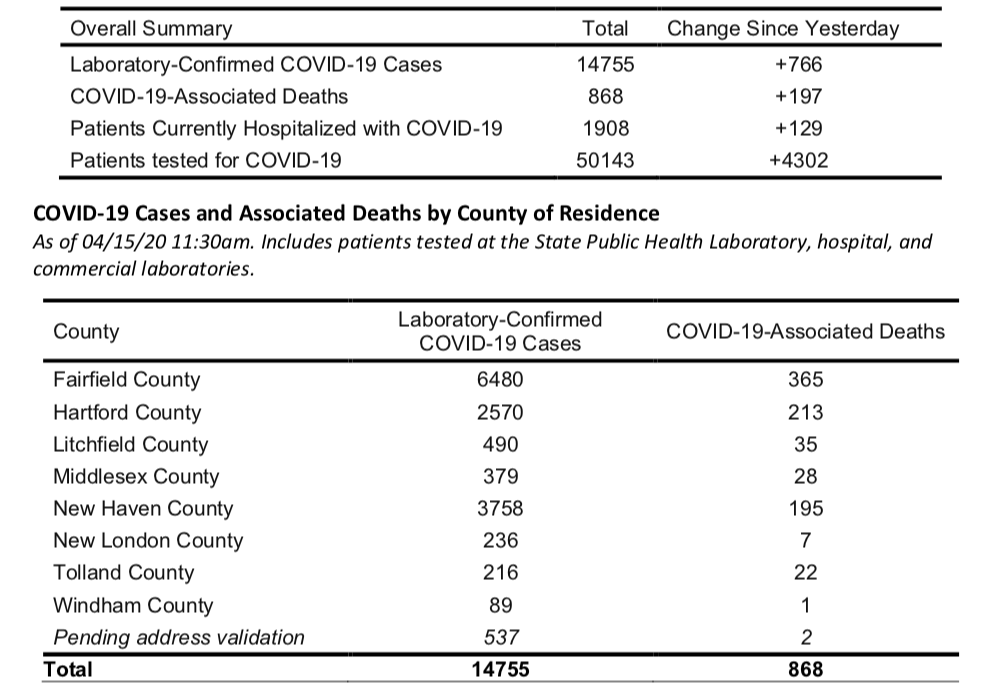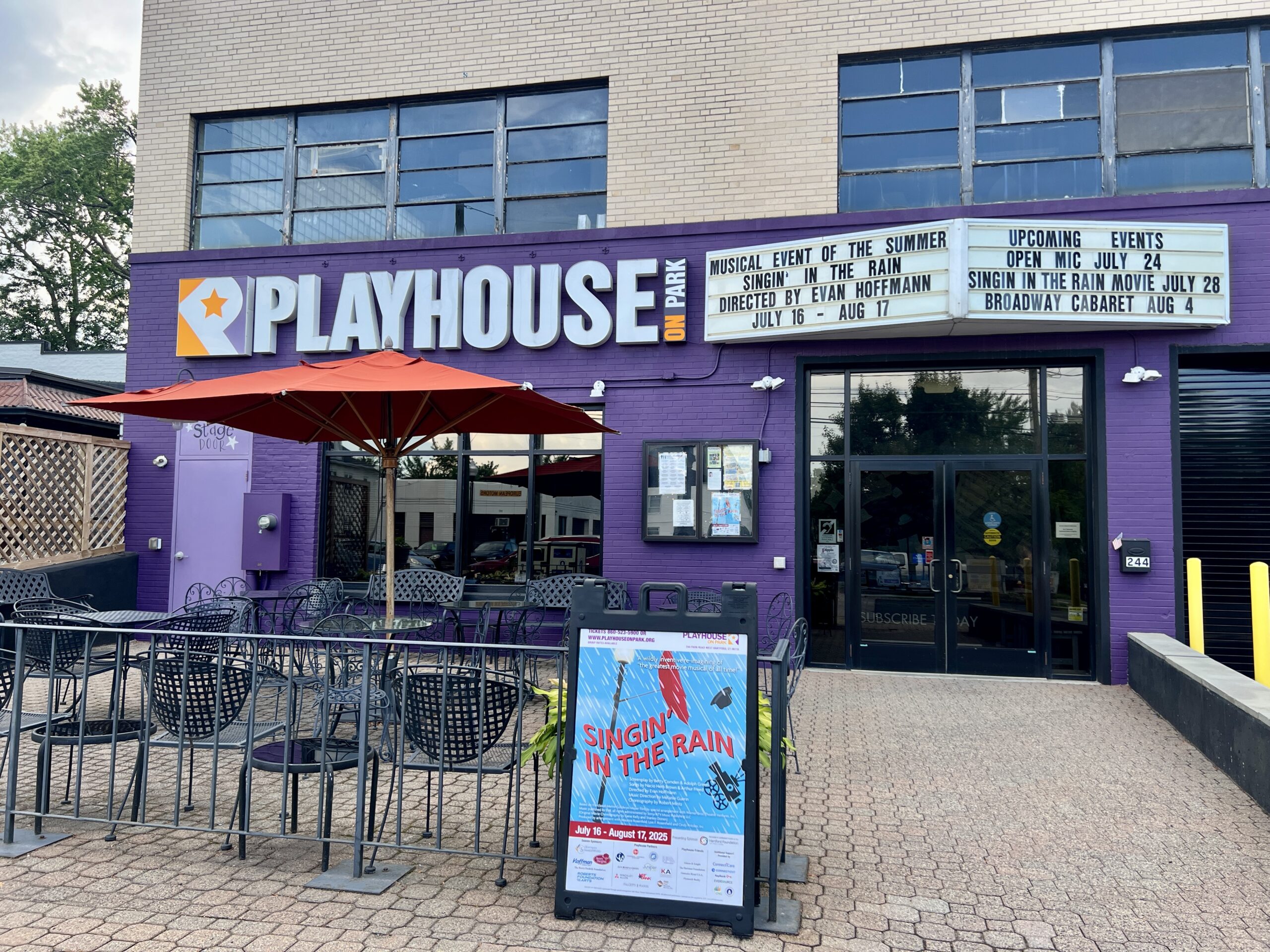As New COVID-19 Deaths Grow, Lamont Considers Executive Order on Masks

Audio By Carbonatix

A sign thanking health care workers is tied to the iron fence in front of St. Francis Hospital, thanking them for their efforts treating COVID-19 patients. Photo credit: Cloe Poisson, CTMirror.org
Despite a few flickers of hope that Connecticut was rounding the bend on COVID-19, nearly 200 new deaths were reported Wednesday and West Hartford’s total number of fatalities is now 17.
By Patrick Skahill, CT Public Radio for CTMirror.org
West Hartford-specific information provided by Ronni Newton, We-Ha.com
Gov. Ned Lamont said Wednesday that he is considering an executive order spelling out when and where Connecticut residents should wear face masks in response to the ongoing pandemic.
Despite a few flickers of hope that Connecticut was rounding the bend on COVID-19 cases, Lamont said Wednesday that virus infections continue to grow, with nearly 200 newly reported deaths.

West Hartford Mayor Shari Cantor created a PSA for residents regarding wearing a face mask.
“If you can keep your social distance, you don’t have to wear a mask,” Lamont said. “If you’re walking down the block and you’re by yourself, that’s fine. If you get to a crowded group, wear a mask. If you go into a store … wear a mask.”
Lamont said the masks don’t need to be medical quality face coverings. A cloth bandanna or handkerchief will suffice.
The Centers for Disease Control and Prevention has issued guidance recommending people wear face coverings in certain situations to protect others from contracting COVID-19. Evidence shows asymptomatic people may be able to spread the virus to others, the CDC said.
“This is the way that we can get this virus – stop it dead in its tracks – and help this state get moving again,” Lamont said.
As of Wednesday, nearly 2,000 people are hospitalized with COVID-19 in Connecticut. The state reported an additional 197 deaths, which Lamont said was attributable to a numerical backlog in reporting – not a one-day death spike.
West Hartford’s total number of cases spiked by 21 on Wednesday, and over the past three days there have been 50 more residents confirmed positive with COVID-19 infections for a total of 142.
“We will continue to see an increase across Connecticut,” said Aimee Krauss, acting director of the West Hartford-Bloomfield Health District. Hartford County has not reached their peak. West Hartford currently has 17 confirmed deaths associated with COVID-19.” She said nine of those deaths were among people over age 80.
“Physical distancing remains one of our best public health prevention measures,” Krauss said.

Still, hospitalizations are growing. In New Haven County, the number of people hospitalized from COVID-19 surpassed 600 on Wednesday.
As he works to contain the virus in New Haven, Mayor Justin Elicker signed an emergency order Wednesday that will require the use of face coverings in essential retail businesses, including grocery stores, big-box stores or wholesale clubs, pharmacies, gas stations, convenience stores, and package stores.
Elicker’s order also specifies that business owners may refuse customers not wearing facemasks. The order will go into effect on Friday morning.
“Wearing a mask is an important way to protect your neighbors, family members, and others from contracting COVID-19,” said Elicker, in a statement. “We are fast approaching 800 positive cases in the Elm City. … Please stay home as much as you can and stay safe.”
Millions In federal aid slated for Connecticut airports
While Bradley International Airport remains open and domestic flights are operating, the Connecticut Airport Authority, which runs Bradley, said many of its airline partners have reduced schedules or dropped their flights completely. To help mitigate similar stoppages nationwide, the government released a multi-billion dollar relief program aimed at shoring up operations at U.S. airports impacted by the COVID-19 pandemic.
“Aer Lingus, Air Canada and Spirit Airlines have temporarily stopped all operations from Bradley,” said the CAA’s Ryan Tenny in an email Wednesday. “Our other airline partners continue to adjust operations on a daily basis…we are currently experiencing over a 95% decrease in passenger traffic.”
Roughly $28.5 million of the federal aid package will go to Bradley, according to a joint statement from Connecticut’s congressional delegation. The money can be used for airport capital expenditures, operating expenses such as payroll and utilities, and debt payments.
“The impacts to our operations will likely persist for months to come,” said Kevin Dillion, executive director of the CAA in a statement. “This assistance is an essential piece of the solution.”
In addition to Bradley, Tweed-New Haven will receive roughly $1.1 million, and Igor Sikorsky Memorial Airport, which is owned by the city of Bridgeport, will get about $150,000.
UConn Health using patient blood to fight COVID-19
As doctors continue to seek new ways to fight the novel coronavirus, UConn Health announced Wednesday that several employees who have recovered from COVID-19 are now in the process of donating their blood to help critically ill patients. The trial will test if the antibodies in that blood could potentially attack the virus and help patients who are sick with COVID-19 more rapidly recover.
The U.S. Food and Drug Administration has approved four healthcare systems for the study, including the Mayo Clinic and Trinity Health Of New England, which runs St. Francis Hospital in Hartford. UConn Health said Wednesday it’s joined the effort using a protocol developed by the Mayo Clinic.
“The use of convalescent plasma is not at all new to medicine, and can be traced back to the 20th century,” said Mauricio Montezuma, site principal investigator for UConn Health, in a statement. “Data on convalescent plasma in COVID-19 is limited; however, two small reports from China are promising.”
Before any donor blood would be transfused to coronavirus patients, it will be tested for several things, including virus-resistant antibodies, UConn Health said.
If the blood is suitable, the plasma will be donated.
Donors must have tested positive for coronavirus, be asymptomatic for 14 days, and have a subsequent negative test for the disease.
‘No cost’ life insurance offered to frontline healthcare workers
Medical professionals in Connecticut and Massachusetts who are risking their lives to providecare to patients infected with the novel coronavirus could soon be eligible for free life insurance, state officials said Wednesday morning.
The no-cost, three-year term life insurance policy would be for medical workers employed at a licensed hospital, an urgent care center, or with an emergency medical services provider. The workers must have exposure to COVID-19 patients.
The life insurance policy, which is offered through Massachusetts Mutual Life Insurance Company, would provide up to $25,000 in no-cost benefits if the worker is between the ages of 18 and 50. Workers between the ages of 51 to 60 will receive a no-cost $10,000 death benefit. Lab technicians, custodial staff, maintenance crews, cafeteria workers, and security personnel will also be considered for coverage, according to state officials.
More details and information on enrollment availability is on the MassMutual HealthBridge webpage.
Support requested for domestic violence and sexual assault victims
A bipartisan group of 39 U.S. senators, including Richard Blumenthal (D-Conn.) and Chris Murphy (D-Conn.), is calling for more federal funding to be made available to support programs for victims of domestic violence and sexual assault.
The $2 trillion coronavirus relief package already approved by Congress includes about $47 million for some domestic violence services, but no funding was allocated for sexual assault and domestic violence support programs operated by U.S. Department of Justice.
Local police and representatives of support services around the U.S. are reporting increased numbers of calls for help from victims of domestic violence and sexual assault. The senators seeking more funding for such programs warn that “abusers are using COVID-19 to isolate their victims, withhold financial services and refuse medical aid.”
Murphy and Blumenthal, along with their colleagues, are asking that any additional relief legislation related to the pandemic include money for sexual assault service providers, law enforcement, transitional housing and other support services.
Connecticut seeking full federal disaster funding for pandemic costs
Gov. Ned Lamont and the state’s congressional delegation are asking that the federal government reimburse Connecticut for 100% of the state’s emergency spending relating to the COVID-19 pandemic. President Donald J. Trump has issued a federal disaster declaration for Connecticut as requested by Lamont, but that would only provide the state 75% federal reimbursement for state costs.
“The size and scope of this public health emergency is unprecedented,” Lamont said. “If approved, this request would bring much needed additional financial assistance to the state and our municipalities.”
In his request, Lamont said the state has already spent about $500 million on pandemic-related programs and services, money that wasn’t in the state budget. The governor said current projections are that Connecticut state government spending on COVID-19 issues “will at least triple to $1.5 billion.”
Relief requested for local farmers
As states across America adopt social distancing mandates aimed at combating the spread of COVID-19, the economic wiring of many local farms has unraveled.
Traditional buyers like nearby restaurants or schools have closed, and many farmers markets have shut down.
In response, the federal CARES Act sets aside $9.5 billion, which the U.S. Department of Agriculture will use to provide support to farmers across the nation.
Last week, senators Blumenthal and Murphy wrote to USDA Secretary Sonny Perdue, advocating that a portion of that money go to local food producers.
Additionally, the senators said they want the USDA to issue direct payments to qualified local farmers that are equal to 25% of annual revenue, up to a maximum of $25,000.
“For those local food producers who can provide information regarding actual COVID revenue loss and added costs, additional disaster assistance should be made available,” the senators wrote.
CT Mirror reporter Greg Hladky contributed to this report.
Reprinted with permission of The Connecticut Mirror.
Like what you see here? Click here to subscribe to We-Ha’s newsletter so you’ll always be in the know about what’s happening in West Hartford! Click the blue button below to become a supporter of We-Ha.com and our efforts to continue producing quality journalism.



